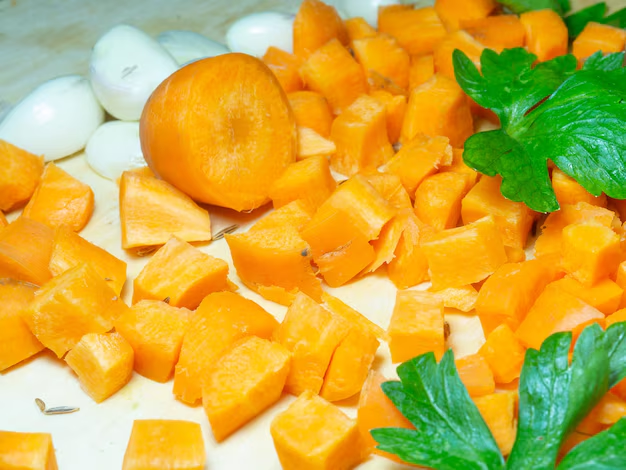🍽️ How long can you keep cooked butternut squash in the fridge?
When it comes to enjoying the delightful and nutrient-rich butternut squash, knowing how to store it properly is key to preserving flavor, texture, and ensuring food safety. This guide explores how long cooked butternut squash can last in the refrigerator, and offers practical tips on extending its shelf life while ensuring it's still safe to eat.
🍂 Understanding Butternut Squash Basics
What is Butternut Squash?
Butternut squash is a type of winter squash known for its sweet, nutty flavor and versatility in the kitchen. It is a robust ingredient, popular in soups, salads, and as a roasted side dish. Its nutrient profile boasts high levels of vitamins A and C, fiber, and potassium, making it a healthy choice for a wide variety of culinary applications.
Nutritional Value
- Rich in vitamins: Packed with vitamins A, C, E, and several B vitamins, crucial for immune function and skin health.
- High in fiber: Promotes digestive health and regular bowel movements.
- Low in calories: Makes it a suitable option for calorie-conscious meal planning.
- Contains antioxidants: Supports overall health by combating oxidative stress.
📦 Storing Cooked Butternut Squash
Optimal Storage Conditions
To maximize shelf life, cooked butternut squash should be stored in an airtight container in the refrigerator. Ensuring the container is sealed prevents moisture loss and flavor absorption from other fridge items.
How Long Does Cooked Butternut Squash Last?
Typically, cooked butternut squash will last 3 to 5 days when stored correctly in the fridge. However, to enjoy its best flavor and texture, it's advisable to consume it within three days.
Signs of Spoilage
- Odor: A sour or unpleasant smell indicates spoilage.
- Texture: Mushy or slimy texture is a sign it's time to throw it out.
- Color: Discoloration or unusual spots can indicate bacterial growth or mold.
🥶 Extending the Shelf Life
Freezing Cooked Butternut Squash
For longer storage, cooked butternut squash can be frozen. Here’s how:
- Cool completely: Allow the squash to cool to room temperature.
- Portion sizes: Divide the squash into meal-sized portions.
- Airtight containers: Use freezer-safe containers or bags, removing as much air as possible.
- Labeling: Clearly mark containers with the date before freezing.
Reheating Tips
When ready to use frozen squash:
- Thaw in the fridge: Slowly thaw overnight.
- Reheat: Use a microwave, oven, or stovetop until thoroughly heated.
Using Preserved Butternut Squash
Frozen squash can be used in dishes like soups, casseroles, or purees, where texture is less critical but flavor still shines.
🍲 Practical Tips for Cooking and Storing
Cooking Tips
- Roasting: Brings out a natural sweetness, great for salads and side dishes.
- Mashing: Combine with other root vegetables for a comforting puree.
- Soups and stews: Adds depth and thickness to broths.
Storage Best Practices
- Avoid cross-contamination: Use clean utensils and prep surfaces.
- Monitor fridge temperature: Ensure it stays below 40°F (4°C).
- Consistent portions: Helps in easy measurements for recipes and prevents waste.
📝 Handy Summary Table
| Task or Tip | Action | Emoji |
|---|---|---|
| Refrigerator Storage | Store in airtight containers, eat within 3-5 days | 🍽️ |
| Freezer Storage | Use freezer-safe bags, label with date | ❄️ |
| Signs of Spoilage | Check for odd smells, slimy texture, discoloration | ⚠️ |
| Reheating | Thaw in the fridge, reheat thoroughly | 🔥 |
| Cooking Advantage | Enhances soups, purees, and roasts | 🌟 |
🧐 Exploring Related Topics
The Art of Meal Prepping with Butternut Squash
Meal prepping using butternut squash can save both time and stress during busy weekdays. Incorporate this squash into various dishes that can be easily refrigerated and reheated.
Incorporating Butternut Squash in Seasonal Recipes
Explore different seasonal recipes using butternut squash as a star ingredient. Be it autumnal soups, holiday sides, or even summer grill-outs, it’s a versatile gem.
Sustainable Practices with Butternut Squash Waste
Learn to utilize the entire squash, from seeds to skin, emphasizing zero-waste cooking methods and repurposing leftovers creatively.
🍴 Wrapping It Up
Prepared with the right methods, cooked butternut squash can remain a delightful component of your meals, offering nutritional benefits while maintaining flavorful versatility. Proper handling, storage, and clever menu planning can extend its shelf life, ensuring that nothing goes to waste. Embrace butternut squash as a staple within your food storage repertoire, for both daily meals and culinary adventures!

